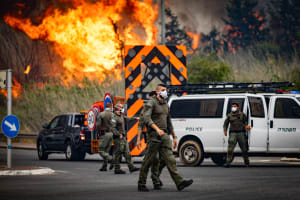Bipartisan opposition to Iran nuclear deal grows as group of Democrats tell Biden the deal being negotiated now is ‘unacceptable and deeply troubling’
18 House Democrats denounce the pending deal, call on the White House to reconsider reviving a nuclear agreement

A group of 18 House Democrats convened a news conference on Wednesday to denounce the new Iranian nuclear deal that “places Iran and Israel on a collision course.”
“We understand that while the recent negotiations have not concluded, we feel that we can’t stay quiet about the unacceptable and deeply troubling turn that these talks have reportedly taken,” said Rep. Elaine Luria of Virginia, who led the group along with Rep. Josh Gottheimer of New Jersey.
Luria said that Israeli ambassador to Washington, Michael Herzog, told her that the new potential agreement “places Iran and Israel on a collision course.”
The Joint Comprehensive Plan of Action (JCPOA) – commonly referred to as the nuclear deal – was authored by then-President Barack Obama in 2015, but former President Donald Trump pulled the U.S. out of the agreement in 2018 and instead placed heavy sanctions on Iran. President Joe Biden has been eager to revive the deal – which now appears to be imminent.
Details of the pending nuclear deal are still clandestine, but recent reports indicated that the U.S. is set to lift sanctions on Iranian entities and individuals that have been directly involved in terror-related activities, as well as restrictions that were placed on the regime’s financial arms. One of the outstanding issues, reportedly, is Tehran’s demand to remove the Islamic Revolutionary Guard Corps from the list of terror organizations.
“It is completely unacceptable to eliminate sanctions on the leadership of the Iranian regime, which has perpetuated terrorist attacks around the world, targeted its own people and destabilized the Middle East,” Luria added.
Gottheimer said that “if Iran has proven anything, it is that they can’t be trusted.” He laid out the worst-case scenario for a revival of the 2015 deal, as “a nuclear Iran, regardless of what commitments are made, funding Hezbollah, Hamas through these, giving billions of dollars to fund terror around the world to kill Americans to attack our bases, and of course, to kill our allies.”
Rep. Donald Norcross of New Jersey invoked Russia’s invasion of Ukraine to emphasize the danger that Iran poses to the world.
“We need only look to today’s headlines to see what happens when you have madmen with nuclear weapons and what they can do,” he said.
The 18 Democrats differ in their level of dismay over the deal. Some express concern while others are outright opposed to it, Rep. Luria said. For some, this was the first time they publicly expressed their concerns over the potential revival of the JCPOA.
One area of wide agreement was their desire that Congress would be better informed and involved in the process. They also demanded an opportunity to vote on a new nuclear deal.
Rep. Juan Vargas of California said the Biden administration has kept Congress in the “dark” and the way that the secret talks have been conducted reminds him of the original 2015 deal.
“It was a bad deal then, and it's a bad deal now,” he stressed.
In a conversation with AIPAC on Tuesday, New York Democrat, Rep. Ritchie Torres, said that he would like to see the congressional oversight of any agreement. Torres suspects that if the agreement was to come to Congress for a vote, there would be bipartisan opposition against it in both chambers.
However, such a vote might not even take place.
“My understanding is that there are lawyers in the administration who are attempting to distinguish between an amendment to the JCPOA, which would be exempt from congressional review, and a new agreement which would be subject to congressional review. That strikes me as hair splitting typical of lawyers,” Torres said.
“For the U.S. Congress to stand on the sidelines of something so critical, would be the abdication of our oversight function,” he added.
Other House members who joined the news conference on Wednesday included Dean Phillips of Minnesota, Jared Golden of Maine, Vicente Gonzalez of Texas, Haley Stevens of Michigan, Tom Suozzi of New York, Brendan Boyle of Pennsylvania, Darren Soto of Florida, Val Demings of Florida, Jim Costa of California, Grace Meng of New York, Lois Frankel of Florida, Kathy Manning of North Carolina, Shontel Brown of Ohio and Susie Lee of Nevada.
Among Senate Democrats who voiced their concerns over the nuclear deal with Iran is Sen. Bob Menendez of New Jersey, who said “no deal is better than a bad deal.” Sen. Joe Manchin of West Virginia told the Jewish Insider on Wednesday that he is likely to oppose the potential deal, saying that he is “very leery” of the negotiations.

Tal Heinrich is a senior correspondent for both ALL ISRAEL NEWS and ALL ARAB NEWS. She is currently based in New York City. Tal also provides reports and analysis for Israeli Hebrew media Channel 14 News.














